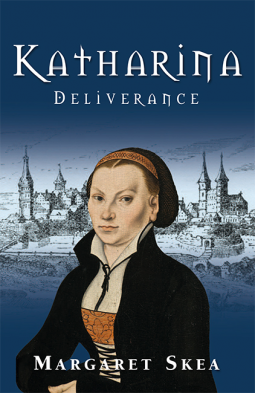
Katharina: Deliverance
by Margaret Skea
This title was previously available on NetGalley and is now archived.
Send NetGalley books directly to your Kindle or Kindle app
1
To read on a Kindle or Kindle app, please add kindle@netgalley.com as an approved email address to receive files in your Amazon account. Click here for step-by-step instructions.
2
Also find your Kindle email address within your Amazon account, and enter it here.
Pub Date Oct 18 2017 | Archive Date Nov 30 2017
Description
It is very shameful that children, especially defenceless young girls, are pushed into the nunneries. Shame on the unmerciful parents who treat their own so cruelly.’ Martin Luther
Germany 1505
Following the death of her mother and her father’s remarriage, five-year-old Katharina is placed in the convent at Brehna. She will never see her father again.
Sixty-five miles away, at Erfurt in Thuringia, Martin Luder, a promising young law student, turns his back on a lucrative career in order to become a monk.
The consequences of their meeting in Wittenberg, on Easter Sunday 1523, will reverberate down the centuries and throughout the Christian world.
A compelling portrayal of Katharina von Bora, set against the turmoil of the Peasant’s War and the German Reformation … and the controversial priest at its heart.
Advance Praise
Katharina transported me back in time to the 16th century and I felt as though I was inside Katharina’s mind and felt what she was feeling. I was fascinated and so anxious for her right from the start as a small child.
This novel has vastly expanded my knowledge of both Luther and Katharina in a most moving story. I like the dual aspect time line and the way historical facts are woven into their story. It is a dramatic story too. I loved it and am looking forward to the next one.
Books Please
Margaret Skea has a brilliant eye for historical detail. She creates characters who take us by the hand so that we never stumble or wonder where we are.
When Katharina von Bora’s mother dies and a step mother arrives, she is parcelled off like many girls of her generation to a convent where she reconciles herself to the harsh regime without ever quite giving up thoughts of a life beyond its walls. Meanwhile a radical priest is stirring up rebellion in the church, questioning not just the sale of indulgences but also the barbarity of imprisoning girls against their will. . As the Reformation gathers momentum, Katharina and a group of her friends are ‘sprung’ from the convent and given shelter in the homes of sympathisers. Here she is party to meetings between Luther and his acolytes where she gives us her particular take on the political and religious disputes of the time. Alongside this we have the emotional journey of a girl whose puberty has been stolen from her and who experiences the joys and sorrows of romance while facing the necessity of finding a husband.
I confess to being almost totally ignorant of the history – and geography – underlying this narrative but in the hands of this very capable author I was deftly guided through unfamiliar terrain. Yes, there were a lot of names to get my head round, but Katharina’s passion and intellectual curiosity are a perfect medium for understanding what was at stake in this period of religious and political turmoil.
Already a fan of Margaret Skea’s Munro series, I recognise the same fluency and the use of telling historical detail which allows us to walk alongside the main character without feeling weighed down by history. This is an engrossing read, my only slight disappointment was not to discover how Katharina’s marriage plays out. For that I’ll have to wait for Bk 2! A Bacon: Between the Lines
A wonderfully vivid portrait of how a headstrong girl grows into a wry, steely and impassioned woman, carves a path for herself through tumultuous times, and changes the course of history in the process. Skea knows her history, but more importantly, she writes with imagination and humanity.
Professor Alec Ryrie, Durham University and author of Protestants
Marketing Plan
Author appreciates reviews on Amazon, Goodreads, blogs, and Facebook.
Author appreciates reviews on Amazon, Goodreads, blogs, and Facebook.
Available Editions
| EDITION | Ebook |
| ISBN | 9780993333163 |
| PRICE | £3.99 (GBP) |
Links
Average rating from 9 members
Featured Reviews
 Rachel M, Educator
Rachel M, Educator
Historical fiction is not my favourite genre, so I should first confess that I only read this as I know the author. However, I was really pleasantly surprised by how much I enjoyed reading Katharina’s story. Perhaps the greatest compliment I can pay is that I continued thinking about her after finishing the novel, and really want to read the next instalment.
Katharina Deliverance focuses on the childhood and early adulthood of Martin Luther’s wife, and the writer does a great job of weaving Katharina’s story through events and ideas which shaped the Reformation. Sections which focused on Katharina’s evolving occasionally felt a little didactic, and I wonder whether this might put off readers who are more interested in the characters and history than theology, but this didn’t detract from my enjoyment of the book.
I found the two different time periods included in the narrative a little confusing in places, but also liked the way the older Katharina’s memories were used to foreshadow or draw attention to significant characters and events.
Katharina Deliverance depicts a world I knew very little about, but I felt entirely immersed in it as I read, and I’m looking forward to returning when book 2 comes out!
 Samantha W, Reviewer
Samantha W, Reviewer
This novel convincingly portrays a young Katharina Von Bora, a woman who would have been long forgotten were it not for her own boldness and choice of husband. Like thousands of other young girls, Katharina was sent to a convent to relieve her family of the burden of raising and marrying her off. Unlike almost all who had come before her, Katherina chose a different path than the convent at great risk, a path one might say indicates greater faith in God than a lifetime in a nunnery.
Skea does a marvelous job of filling in the gaps in Katharina's life - of which there are many - while working within the framework of known historical facts. It would have been tempting for an author to write Martin and Katharina's story as more romantic than it truly was, but Skea does not give in to this temptation. Katharina makes a decision based on much more than passionate love, a type of decision that is rarely made in modern courtships, and this story is faithfully told.
Though Martin Luther is not heavily featured until later in Katherina's story, he is present through quotes that appear at the beginning of each chapter, giving the reader the sensation that the two were on paths destined to intersect long before they knew each other. While their courtship is not the stuff of a romantic blockbuster movie, we are given hints that they did indeed grow to love each other very much through glimpses of Katharina later in life.
Neither Martin nor Katharina is perfect. Luther's fiery temper and impetuosity is on display, as is Katharina's willingness to firmly defend her own opinions. It is made clear that neither was the other's first choice, but they both determined to make the marriage work, not only for their own sake but for the greater glory of God. 'He is a good man, who, if some of his wilder impulses can be contained, may yet become great.' Become great he did, with an amazing woman to support him.
I am excited to read more of Katharina's story in Skea's next book.
 Rosanne L, Reviewer
Rosanne L, Reviewer
In a story especially apropos for the year of the 500th anniversary of the Reformation, Katharina: Deliverance follows the story of Katharina Von Bora, from her entrance into a convent at the age of five to her marriage to Martin Luther at the age of twenty-six. When her father remarries, the unwanted child is sent away to the cloister where she grows to adulthood under the strict rules of the silent Cistercian order. But the convent’s way of life is soon to be challenged. Martin Luther’s inflammatory writings are spreading throughout Germany, even being smuggled into the convent for the eager nuns to read.
With a group of other nuns, Katharina von Bora makes the decision to abandon the life she knows and flee the convent. Luther aids the nuns in their escape and, once they are all safe in Wittenburg, strives to find them shelter…and husbands. Katharina lodges with the town clerk for a few months and then moves to the home of the Cranachs. A burgeoning romance develops between the former nun and Jerome Baumgarten, a former student of Luther’s. But when Jerome leaves Wittenburg to seek his parents’ approval for the match, he disappears from the scene permanently, and Katharina is left to wait and grieve. Feeling responsible for her fate, Luther encourages a second match between Katharina and one of his colleagues, Kaspar Glatz, but she is disgusted by him and refuses him in no uncertain terms.
The horrors of the Peasants’ War, and Luther’s lack of diplomacy which leads in part to the tragedy, provide a solemn backdrop to Katharina’s life in the Cranach household. Caught between the justifiable anger of the starving peasants and the God-given authority of the tyrannical aristocracy, Luther encourages the rulers to show charity and the peasants to submit, but he seems to only draw anger from both sides. Katharina and the rest of the burghers in Wittenburg can only watch and wait and hope that the atrocities occurring in other castles and cities will not enter their town.
Luther is portrayed as a public figure at first–it seems that Katharina perceives him more as a symbol of the Reformation than as a flesh-and-blood man. I loved the choice the author made to wait to provide a physical description of Luther until Katharina begins to look at him differently–to think that perhaps he is a man she could marry. She has told her friend Eva that, “He is a good man, who, if some of his wilder impulses can be contained, may yet become great.” And finally, she realizes, with the urging of her friends the Cranachs, that perhaps she is just the one to contain him, to provide the assistance he needs to change to world.
In the Author’s Note, Skea draws attention to the lack of historical evidence surrounding Katharina’s life. There are very few details we know for certain. Much of the heroine’s character must be deduced from Luther’s own letters. Skea has tried her best to fill in the monumental gaps, and in my assessment, she does a convincing job. The sixteenth century world comes alive with her spare prose, provoking many interesting questions: how would a nun feel when entering the real world after such a restrictive life? What is the responsibility of a man when his ideas are taken farther than he intended?
Skea also draws attention to the role of women in the sixteenth century in a refreshing way. Without creating an anachronistically modern heroine, she shows how Katharina (by speaking her mind in the company of men) flouted convention, providing a spirited picture of the young woman who would eventually become Luther’s “my lord Katie” and set the pattern for Protestant marriages.


















